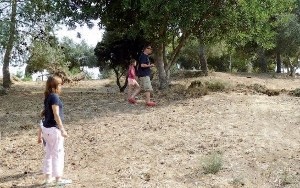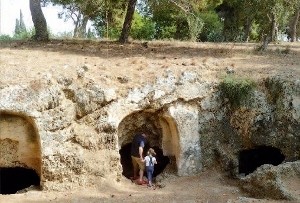Hide and seek
Imagine a pastime which can be enjoyed by the whole family and gets you out into the fresh air; gets you walking and introduces you to unusual, interesting and beautiful places that you may not know even existed. It's free and can be carried out in many locations near your home or anywhere that you might be visiting
That is Geocaching (pronounced geo-kash-ing), an activity that encompasses all of the above and much more. Geocaching is a real-world, global, outdoor treasure hunting game. It is treasure hunting for the digital generation.
All you need is a handheld GPS device (most smart phones have this function), some energy, flexibility and a sense of fun.
Players try to locate hidden containers, called geocaches, using their GPS device and then share their experiences online. It's like a treasure hunt, albeit without valuable treasure, which requires you to dig around, hunt, follow coordinates, hike, climb, brace yourself, figure out clues and brush off the dirt when you finish.
It takes you to places you've never been, and makes you look at ordinary objects in a new light. Just think, in the park where you regularly walk, there may be a tiny 35 mm canister containing a logbook, mini-pencil and maybe a small gift, hidden in the crevice of a rock or pushed into the inner wall of a potted plant.
So, how does it work?
A Geocacher will go to a location of their choice where they will hide a waterproof package. This will contain a logbook, pen or pencil and maybe a small token gift. The packages can vary in size and the difficulty of finding a cache also varies greatly.
Using their smart phones, the cachers record the coordinates of their caches and return home to log their existence on a website. Another cacher will see the listing about the cache, enter the coordinates into his or her GPS or smartphone and go in search of it.
When they find it, the cachers will write their user names and the date on the log sheet and maybe take the small gift and leave something in return
When the seekers return home, they log on to the geocaching website, enter the fact that they have found the cache and pass any comments that they wish. These logs are important not only for people in the future who will be geocaching in the area, but also to the cache hider. It is part of their "reward" for hiding the cache.
Of course, in order to keep the game going, the seekers must also become cache hiders.
We were introduced to Geocaching by our daughter and her family who were visiting us from the UK. They are keen cachers and have set up a cache in the village where they live in the English countryside. They have to maintain it, make sure that the log is usable and see that no one has "muggled" it, that is, stolen it or made it unusable. They have geocached in many areas in the UK and in other countries.
We could see that there are a number of sites within 2 km of where we live in Herzliya, the nearest one just 600 meters away as the crow flies. Using a map and the compass that is built into the geocaching application we had downloaded onto our smart phones, we (all three generations of our family - this is not just for fit young people) followed the arrow and found ourselves in a small glade where all we could see were trees. Where was the cache? My 8 year-old granddaughter (by now an expert geocacher) soon found it - a loose piece of bark hidden in the tree trunk. The next one we found was in a park that we did not even know existed although it is only 2 km from where we live. There is an ancient burial site in this park in Kfar Shmaryahu and the cache was located inside a small cave there. This is one of the pleasures of geocaching; not only do you go to new and interesting places, but often the description of the cache gives some details about what the place is and why the cache has been placed there.
To become a geocacher you have to register at the geocaching site, and download a geocaching app to a phone with a GPS application. This app includes the compass and enables you to download a list of all the geochaches in Israel. There are hundreds of caches hidden in all kinds of places in parks, in towns and in the countryside.
The challenge of geocaching involves using a map and the compass and following digital marker points. If you walk in the wrong direction, your phone will show you. When you're right on top of the cache, it's time to start searching for the hidden treasure. If you are having difficulty finding it there is often a hint, but the hints can sometimes be quite cryptic. This just adds to the fun of geocaching. Once found, write your details on the log book and return the cache to exactly where it was found.
It's a way to connect with people from around the world. Geocaching is an international activity; there are over 6 million people all over the world hunting for over 2 million geocaches.
There are few activities that are so varied and are free. It is also very good exercise, and people of all ages can geocache together.
Geocaching is not stressful. Clues to where a cache is hidden could be simple, given very cryptically or one clue can lead to another. It is a problem-solving activity and develops feelings of accomplishment when a cache is found. There is no consequence for failing. If you can't find the cache you won't lose a game, you aren't fined, and you don't have to clean up any mess! You simply log in that you couldn't find it and move on to the next search. With geocaching, you do not have to plan ahead. You can arrive anywhere, take out your smart phone and see if there is a cache within walking distance.
A good idea is to find a place where you can walk from cache to cache, possibly making a circular walk and hunting for several caches as you go along, walking to each one in turn. Some may be easy to reach and others could require climbing skills, or need mental skill to unravel cryptic or coded directions. They are placed in all kinds of locations which might be unknown or obscure as well as in known and famous places. There is one outside the Houses of Parliament in London that is very well-frequented and educational. From city streets to isolated countryside, geocaches can be found just about everywhere. There is even a geocache orbiting the earth on the International Space Station (but only one person has logged it!)
This is fun for the whole family.
For more information go to www.geocaching.com. It explains much more about this fascinating pastime, tells you how to register and gives you information about all aspects of the game.
To find out more about geocaching in Israel, search online for Geocaching Israel, and various sites come up.
When you have downloaded the geocaching app onto your smart phone, you will be able to locate very easily all the sites nearest to you.
Geocaching in action: Barbara Lyons' granddaughter and her parents go looking for the cache in a park in Kfar Shmaryahu. After searching, they find the item hidden in a cave











Comments